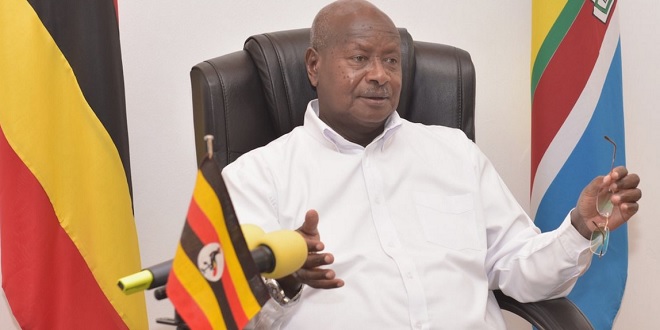
On matters which are well articulated in the constitution, we don’t need his personal opinions because he is under obligation to speak to and defend the law because he has taken an oath of allegiance.”
Nicholas Opio, the executive director of Chapter Four, a Kampala based human rights agency recently told The Independent that President’s Museveni’s “rhetoric” shields security agencies from accountability.
“You cannot say that because Kawooya was biting the hand of the security officer, he deserved what he got. That is absolutely wrong,” Opio told The Independent.
“Unfortunately, his rhetoric undermines the pain and suffering of people like Kawooya and James Akena whose lives can be completely altered by these acts of these security agencies.”
“The president must condemn torture because there is no justification for torture under any circumstance. He must stop shielding security institutions from accountability and must act swiftly to rein in errant members of his security agencies.”
Michael Kabaziguruka, the opposition MP for Nakawa Municipality who is also a member of the Presidential Affairs Committee in the 10th Parliament, told The Independent that what comes out in Museveni’s letters is often cosmetic.
“We all saw the video footage. We did not see Kawooya biting anybody but instead we saw these vicious men assaulting him,” he said.
“I would expect him to come out boldly to say that the perpetrators of torture must be handled to the full extent of the law. He should not only say it but should also be seen to do it,” he added.
Kabaziguruka said cases of torture are on the increase because security agencies have been heavily politicized to the extent that their cardinal responsibility now is to protect President Museveni and not the people of Uganda, their lives or property.
“So whatever they do, they take it so personal; especially if you are perceived as somebody who stands in the way of Mr. Museveni,” he says, “The minds of the security forces have been programmed to look at dissenting voices as the enemies of the state who must be crashed.”
Torture increasing
According to the 2016 Uganda Human Rights Commission (UHRC) report, torture or cruel, inhuman or degrading treatment or punishment has topped the six highest human rights violations registered by UHRC since 2010.
In 2016, of the 1,144 human rights violations that UHRC registered, 380 were torture complaints with the police, UPDF and the prisons service accounting for 85% of the alleged crimes.
The African Centre for Treatment and Rehabilitation of Torture Victims (ACTV), which offers free treatment and rehabilitation services, also says the majority of over 6000 Ugandan survivors of torture they have interacted with in the past six years allege to have been violated by the Uganda Police.
UHRC says torture mostly occurs during arrest and pretrial detention of suspects in police cells and prisons as well as torture chambers/safe houses and army detaches. The report says security agencies use torture as a tool of investigation to obtain information for criminal prosecution.
There have also been cases where rogue security agents torture civilians to extort money, fulfill vendettas, and on behalf of clients. In many cases those tortured are either suspected or accused of being political opponents of Museveni’s government; especially members of the Allied democratic Forces (ADF).
Although the brute force used by Uganda’s security agents has been widely condemned by local and international human rights advocates, every new arrest appears to be more brutal than the previous one.
In May 2017, Ugandans were left in shock on seeing the gruesome and ghastly pictures of Geoffrey Byamukama, the Kamwenge mayor, who had been tortured by the police over alleged involvement in the murder of former Assistant Inspector General of Police, Andrew Felix Kaweesi.
In the days that followed, more pictures of tortured inmates at the dreaded Nalufenya detention facility in Jinja trended on social media. The facility was eventually closed by the new IGP, Ochola Okoth.
As members of the public jubilated over the closure of Nalufenya, human rights advocates cautioned that, that might not be the end of torture.
Then in September 2017, state security agents entered the Parliamentary Chambers, battered and violently removed opposition MPs who were opposed to a controversial motion that eventually saw the deletion of Article 102 (b) of the constitution that limited the age for presidential candidates in Uganda at 75 years.
Recent incidents of security agents torturing civilians occurred in August when opposition MPs Robert Kyagulanyi (Kyadondo East), Kassiano Wadri (Arua Municipality), Francis Zaake (Mityana Municipality) and Paul Mwiru (Jinja East) and over 30 civilians were violently arrested for allegedly throwing stones at President Yoweri Museveni’s convoy in the northwestern town of Arua hours before a by-election.
They were badly beaten and Kyagulanyi had to undergo treatment in America while Zaake was treated in India. The two cases have put Uganda among the torture capitals of the world.
Livingstone Sewanyana, the executive director, Foundation for Human Rights Initiative (FHRI)—a human rights advocacy organisation that has been focusing on civil liberties in Uganda for the last 25 years says until there is political will to fight torture, the country will continue seeing horrific torture incidents similar to Byamukama, Akena, and Kawooya.
The 2016 UHRC report documents how torture in the country is a persistent human rights issue despite the existence of a specific law criminalizing it— the Prohibition and Prevention of Torture Act, 2012.
 The Independent Uganda: You get the Truth we Pay the Price
The Independent Uganda: You get the Truth we Pay the Price



